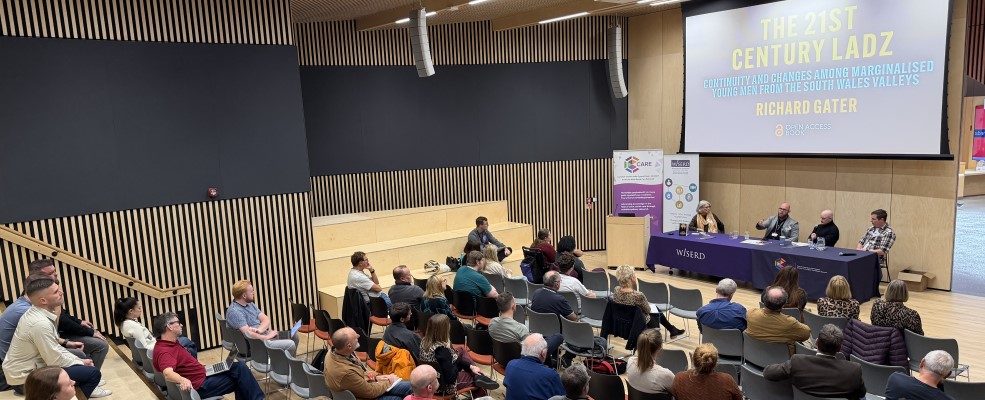Young men, masculinities, education and employment are gaining increasing societal attention. On 17 October in sbarcIspark, we launched an important new publication in this field of research by Dr Richard Gater, a research assistant at the Centre for Adult Social Care Research (CARE) and previously a postdoctoral research fellow at WISERD.
Dr Gater’s timely new book, The 21st Century Ladz: Continuity and Changes among Marginalised Young Men from the South Wales Valleys, explores these themes through in-depth research in the South Wales Valleys, offering fresh insight into how young men navigate identity and change.
Chairing the event was Jean Jenkins, Emerita Professor of the Cardiff Business School and WISERD co-director. We were also delighted to be joined by Dr Alex Blower, founder of the Boys’ Impact movement. Dr Blower provided context for some of the book’s themes, based on his own experiences growing up and from starting a movement dedicated to improving the outcomes for boys and young men experiencing socio-economic inequality.
Dr Blower shared insights from the latest research and evidence published in the Boys’ Impact reports, covering challenges in educational attainment and aspiration, in navigating mental health, social media and the ‘manosphere’, and the pressure of living up to ‘what a man should be’.
He emphasised the urgent need to provide a counter narrative to what is being presented to society as “Stereotypes and assumptions embedded in notions of deficiency” and pointed to Dr Gater’s research as integral in this pursuit.
Dr Blower’s insightful introduction was followed by a meet-the-author-style discussion with Dr Richard Gater and Dr Dan Evans, author of ‘A Nation of Shopkeepers: The Unstoppable Rise of the Petite Bourgeoisie’. Together, they explored key sections of Dr Gater’s new book.
The conversation centred around the disconnect between young men and teachers, and the challenges this creates in terms of mutual respect and approaches to education, the different types of masculinities presented in the book, and the role of place and family being essential to the creation of these. The future of employment for men doing what are traditionally perceived to be ‘men’s jobs’ was also discussed.
Some of the types of masculinities covered included protest masculinity, born from deprivation and frustration with the system, the social construct of toxic masculinity, and Dr Gater’s theory of amalgamated masculinities, a combination of protest masculinity with modern, progressive masculinity, in which ‘softer’ behaviours are evident and there is a notable influence from cultural role models, particularly sports personalities.
Members of the audience were invited to join the conversation, resulting in a stimulating discussion around how we, as a society, can create spaces to foster men’s relationships with each other and their communities, and how policymakers might consider using the school curriculum as an opportunity to introduce these sorts of discussions at an early age, so, as Dr Alex Blower suggested in his introduction, young men can be encouraged to think about who they want to be when they leave education, rather than just what they want to be.
Dr Richard Gater said: “The event was a surreal experience; one I could never have envisaged as a young man who rejected education. I was pleased that it brought together influential people and sparked discussion about how we can improve the life chances of marginalised young people.”
The 21st Century Ladz: Continuity and Changes among Marginalised Young Men from the South Wales Valleys is available to read via Open Access, or to purchase as a paperback on Emerald.com. There is a discount code to receive 30% off this title for a limited time – use code: EME30.
Dr Richard Gater is a research assistant at the Centre for Adult Social Care Research (CARE), with knowledge of masculinities related research and qualitative research methods. He began drafting this book while employed as a postdoctoral research fellow at WISERD, where his post was supported by WISERD’s Civil Society research programme. The WISERD Civil Society research programme was funded by the Economic and Social Research Council (ES/S012435/1). The support of the ESRC is gratefully acknowledged.

